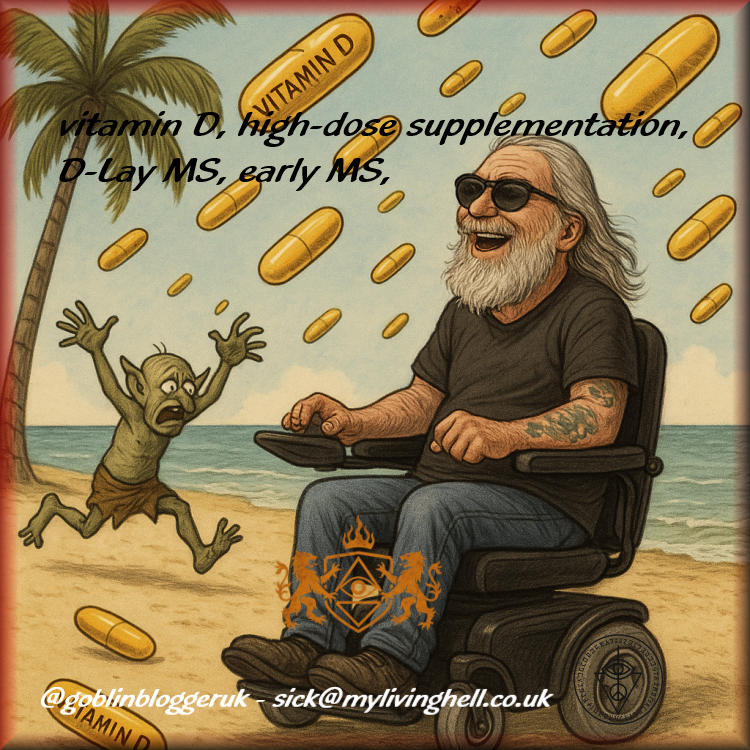- Posted on
- • Uncategorized
Vitamin D, CIS & MS: Could High-Dose Sunshine Pills Slow the Horror?
- Author
-
-

- User
- sick
- Posts by this author
- Posts by this author
-
⚠️ Please read with care: This blog shares personal, sometimes painful experiences. My intention is to support and speak honestly not to harm. I’m not a professional, just someone who understands how hard it can get. If you're struggling, you're not alone please reach out for professional help.
Vitamin D has always been the vitamin of “maybe helpful, probably harmless.” If you live in the UK and know rain better than sun, you’ve probably popped a tiny supplement every winter while half your bones creak. Recently, the D-Lay MS trial dropped. And what it suggests is: maybe we’ve been too timid.
303 people with Clinically Isolated Syndrome (CIS) who had low vitamin D were split into two groups. One got 100,000 IU vitamin D every two weeks for 2 years. The other got a placebo (because science is cruel). After 24 months:
- Those on vitamin D had a 34% lower chance of new lesions or relapses.
- Time to first new MRI change/relapse doubled (432 vs 224 days).
- MRI scans showed fewer abnormalities in the vitamin D group.
- Serious side effects? Pretty similar to placebo. Nothing obviously wild.
Sounds good. But: this was early MS / CIS. Might not help someone whose disease is long-standing or whose body is already ravaged. And 100,000 IU every two weeks is way above what the NHS currently recommends for supplementation. Also, still not tested as a replacement for disease-modifying therapy — more like a sidekick.
Mechanism of Action
Vitamin D is thought to influence immune function, potentially modulating the inflammatory processes that contribute to MS progression. This could explain why higher levels might be beneficial for those with CIS.
Current NHS Guidelines
The NHS currently recommends a daily intake of 10 micrograms (400 IU) of vitamin D for most adults, which is significantly lower than the doses used in the D-Lay trial. This discrepancy highlights the need for further discussion with healthcare providers.
Long-term Effects
While the trial showed promising short-term results, more research is needed to understand the long-term effects of high-dose vitamin D supplementation on MS progression and overall health.
Patient Experiences
Anecdotal evidence from patients who have tried high-dose vitamin D suggests varying experiences. Some report improvements in symptoms, while others see little change. Personal stories can provide valuable insights into the potential benefits and limitations of this approach.
Future Research Directions
Ongoing studies are exploring the role of vitamin D in MS and other neurological conditions. These future investigations may provide more definitive answers regarding optimal dosing and long-term safety.
Dietary Sources of Vitamin D
In addition to supplementation, dietary sources of vitamin D include fatty fish (like salmon and mackerel), fortified foods (such as cereals and dairy products), and egg yolks. Incorporating these foods can help boost vitamin D levels naturally.
Lifestyle Factors
Lifestyle factors, such as sun exposure and diet, significantly influence vitamin D levels. Engaging in outdoor activities during sunny months can help increase natural vitamin D synthesis in the skin.
Consultation with Specialists
It’s crucial to consult with specialists, such as neurologists or endocrinologists, for personalized advice on vitamin D supplementation and MS management. They can provide tailored recommendations based on individual health needs.
So here’s the “what you might do if you were scrappy and tired of waiting”:
- Ask your neurologist about testing your vitamin D levels, especially if they’re low.
- If you’re in early MS or CIS, and deficient, ask whether high-dose vitamin D (with proper monitoring) might be an option.
- Don’t assume that more is always better — risks still exist (hypercalcaemia, kidney issues, etc.).
- Keep using your DMTs and other treatments. This looks like a companion, not a cure.
Dark Sarcasm Moment: We’ve spent decades being told low vitamin D might increase MS risk, yet when trials run, “no effect.” Now suddenly, dosage + timing = possibly useful. Took long enough.
This revised summary provides a comprehensive overview of the D-Lay MS trial and its implications, while also offering practical advice and additional context for readers.
I write in ink and fury, in breath and broken bone.
Through storm and silence, I survive. That is the crime and the miracle.
